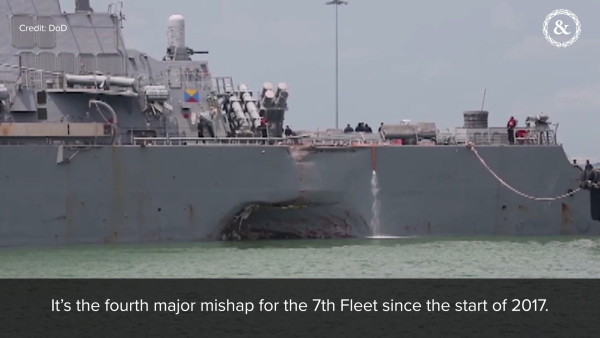

Facing a shortfall of roughly 6,200 sailors at sea, top Navy commanders promised lawmakers that they won’t force undermanned and undertrained crews to deploy.
In 2017, the destroyers USS FItzgerald and USS John S. McCain were involved in separate collisions in the Pacific that claimed the lives of 17 sailors. Since then, the Navy has tackled the underlying causes of the deadly collisions by increasing the size of destroyers’ crews and adding training for surface warfare officers. But the Navy still does not have enough sailors at sea.
Adm. John Aquilino, commander of Pacific Fleet, and Adm. Christopher Grady, commander of Fleet Forces Command, testified on Tuesday that the Navy still has about 6,200 billets at sea that need to be filled. If Congress passes spending bills on time, they estimate the Navy will be fully manned by 2024.
Navy officials could not specify which at sea billets the service needs to fill. Both admirals told the House Armed Services Committee that they will not send ships with crews that are not properly manned, trained, or equipped on deployments.
“It is, I believe, both fleet standards that no one deploys without the full complement of people,” Grady said. “We do not ask a ship nor direct a ship to go on mission if they are not certified to do the job. Indeed there have been several occasions where I have said: ‘That ship is not ready. We will need more time.’ We know what the requirement is and if they’re not ready, they’re not going.”
Aquilino said he had cancelled two ships’ deployments because he did not feel the crews had enough training for the missions. One ship was supposed to join the Coast Guard as part of the Oceania Maritime Security Initiative to protect fisheries and the other was supposed to join the biennial Rim of the Pacific Exercise, he said.
In both cases, Adm. Phil Davidson, head of Pacific Command, approved Aquilino’s recommendations not to deploy the ships. Davidson also allowed Aquilino to reduce the time a carrier strike group needed to be available to surge by about three months so it could prepare for maintenance.
However, ProPublica reported on Tuesday that Davidson told skippers in November 2017 that they would be deployed even if they did not feel their ships or crews were ready.
“If you can’t take your ships to sea and accomplish the mission with the resources you have then we’ll find someone who will,” ProPublica quoted Davidson as saying.
Asked about Davidson’s reported comments on Tuesday, Aquilino said he was not at the meeting cited in the story so he could not say if the article was accurate.
“What I can tell you is the deeds that he’s implemented match the guidance that he’s given me,” Aquilino said. “So by him reducing some of the operational demands in the Pacific, to me that’s a pretty strong example of someone who understood the concerns when the report was written and doing his part to ensure that it doesn’t happen again as well.”
All ships deploying in the Pacific must have at least 95 percent of their crew, of which 92 percent of the sailors must be “the right person with the right skills in the right job,” he said.
Aquilino told lawmakers that he is briefed several times a week about readiness and maintenance issues for deployed ships as well as ships getting ready to deploy. If he sees any indications that a ship’s crew is not properly manned, trained, or equipped — or any other reason why the ship is unsafe — he will terminate the deployment.
“As you know, the world gets a vote, so depending on what’s going on we have had very frank conversations,” Aquilino said. “Again, in the instances I have identified, Adm. Davidson concurred with my recommendations and we did not deploy those ships.”